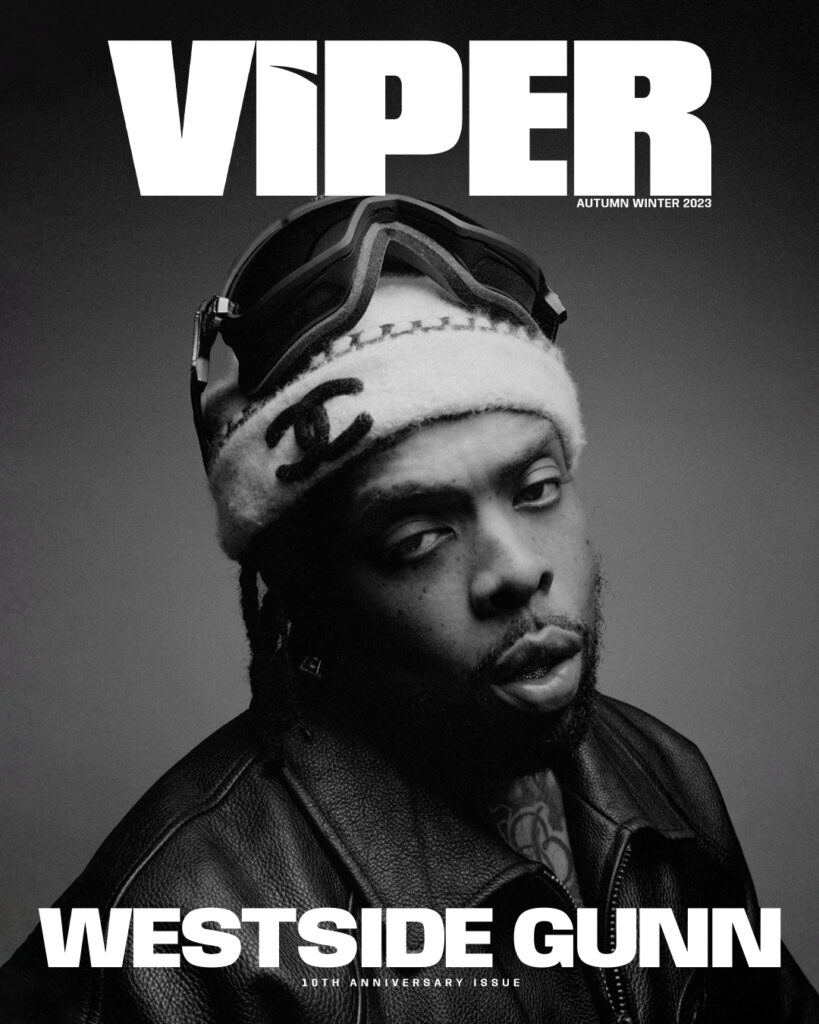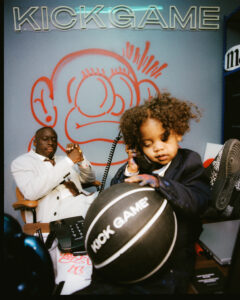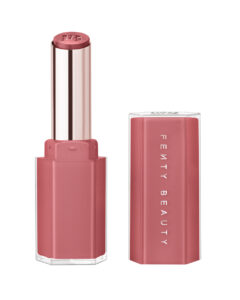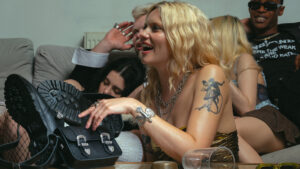Beautifully ornate designs for the diverse array of Island Girls and Dancehall Queens are the knitted creations that are being projected into the spotlight by clothing brand, Knots and Vibes. The brand and it’s affiliation with Dancehall culture highlights an alluring relationship extending beyond the entertainment and into an educational journey altering the all common perception that have been miscommunicated for the females involved.
With growing workshops and opportunities for women in the Caribbean, Viper chats with Luci Wilden, founder of the brand to understand how the Knots and Vibes vision was created and continues to be nurtured.

Would you like to start by talking to me about yourself and your journey as a creative?
I studied photography and fashion styling at the London College of Fashion but neither of those avenues seemed like the right path for my ‘career’. I ended up going down the Fashion PR route and worked in a couple of agencies, predominantly with sportswear brands. Although I enjoyed working with brands, I didn’t really feel fulfilled as it wasn’t a very creative role. I started crocheting as a hobby and got completely obsessed with it, I was just making the kind of things that I wanted to wear but couldn’t find anywhere else.
I had no intention or desire to create a brand but friends and acquaintances began ordering custom tops from me so it just went from there! I ended up leaving my job and taking a few months out of my ‘career’. I moved to Jamaica for 3 months to focus on developing Knots & Vibes and spent the following year back and forth between JA and London; this was instrumental in forming the brand’s identity.

What was your initial vision for Knots and Vibes? Do you feel like this has been fulfilled?
To be honest, when I started Knots & Vibes, I didn’t really have a vision! I just really enjoyed crocheting and experimenting with designs. Gradually over the last few years, the ‘vision’ has become much more clear to me and the brand has become so much more than I ever thought it would be.
Aside from striving to create unique clothing designs, Knots & Vibes has become a platform to celebrate Jamaican dancehall culture, a brand that provides opportunities for girls and women the Caribbean through crochet workshops, a tool to empower and inspire women, and an advocate for ‘slow’, ethical fashion.

I know that Knots and Vibes has become a great platform for the celebration of dancehall culture. Let’s talk about taking away that negative stigma attached to the genre.
Coming from the Jamaican ‘ghettos’, Dancehall has historically had a bad reputation. Since the late 70s and 80s it has been looked down upon by the ‘uptown’ (upper-class) Jamaicans, and to some extent, it still is. While reggae was seen as the highest form of ‘culture’ and source of Jamaican pride, dancehall was labelled as vulgar, violent, a corruptor of the youth and thought to embody everything ‘slack’ in Jamaican society.
Although things have improved and dancehall is more widely accepted and celebrated than it was before, there are still negative connotations attached to the genre. The one that I aim to tackle in particular is the view that dancehall demeans and objectifies women, re-enforces misogyny and perpetuates abuse against women. I understand where these viewpoints come from, but you can’t ignore the female dancehall artists and dancers that continuously fight back against the male patriarchy, and have in effect pioneered their own feminist movement. Women in dancehall symbolize strength and confidence, they assert their dominance, command and express their sexuality, all while keeping control.

One element of dancehall culture that is routinely criticised is ‘daggering’ – to outsiders it can look quite aggressive and even demeaning to women, but it’s important to understand that adult consenting women can do whatever they like. Women that participate in daggering are not coerced, abused or taken advantage of, they genuinely enjoy the style of dancing and being part of the entertainment.
There’s also a power-play in the ‘daggering’ dynamic, and men are routinely over-powered and demeaned by women in the dancehall. If you’re not familiar with it, it might seem a bit strange at first – how is dry-humping entertainment? But if you go to a dancehall party in Kingston and experience it first-hand, it really is amazing! The dancers and entertainers are so creative, using props, incorporating gymnastics and often dangerous stunts – it’s basically like Jamaican theatre! Everyone is so happy and there’s no hint of aggression at all.

Why do you think that females in particular have been ‘targeted’ if that can be said?
As usual, there is a massive double standard. In general, men are expected to be sexually charged and having several sexual partners is almost normalised. For some reason, women are the ones who are expected to uphold society’s ‘morality’. When women have several sexual partners, they are often labelled a slut and considered to be unworthy of serious relationships. Although women are much more sexually liberated in dancehall culture, there is still an element of this slut-shaming which is perpetuated by male dancehall singers, all while they are praised and idolised for being a ‘gyalis’.

Can the industry do anything to remove the stigma or do you feel that people’s perceptions need to change?
A bit of both. I think there 100% needs to be more female selectas (DJs) and more opportunities for women in the dancehall music industry in general. It is very male dominated and I’m the first to admit that some artists do continue to express views that I think are backwards. Female artists have to work twice as hard to get noticed in the industry and I honestly don’t know of any female selectas or producers that are well-known in Jamaica’s dancehall party scene. (I would love to hear if I’m wrong!!).
One thing that is great in the industry (but is never credited as something positive…) is that more artists are addressing important issues in their music, for example Spice’s track ‘Black Hypocrisy’ addresses skin bleaching and colorism in the black community, Romain Virgo’s ‘Dutty Man’ speaks out about child sex abuse in Jamaican communities, encouraging people to report it, and Jada Kingdom’s ‘Execution’ speaks out against rapists and paedophiles.
Of course, the graphically violent ‘gun tunes’ are still a bit part of dancehall, because dancehall comes from the ghetto and the artists are only speaking their truth. Hiphop and grime music are the same, yet those genres have become more commercial than ever before, and I don’t see them getting as much bad press these days…
I think that people who are opposed to dancehall do need to open their eyes to see the bigger picture. It is not perfect, there are still problematic lyrics and attitudes, but there is so much positivity coming from the genre too, and from the dancehall community.

One of the greatest things about Knots and Vibes is giving back to the community. I think that’s truly beautiful. Do you want to talk about your decision behind this and why developing skills under workshops is one of the best gifts for the women in Kingston.
The more time I spent in Jamaica, the more I learned about the complex socio-economic issues on the island, particularly those affecting women and girls. I noticed that many women are forced to rely on men for financial support, from husbands, boyfriends or step-fathers. For low-income families, it can be a struggle to send their children to school thanks to expenses like uniform, books, bus fare etc. It’s common for children to not complete schooling, and for those that do, some aren’t able to fully focus on their studies due to problems at home or not having adequate food. With or without an education, there aren’t enough employment opportunities in Jamaica and young women can fall into a cycle of having children and being financially reliant on their partner. This is problematic because regardless of whether they are in a healthy or safe relationship, they have no choice but to stay with this partner unless they have other opportunities for financial support. Mothers who rely on abusive partners leave their children vulnerable to sexual and physical abuse and in some cases even turn a blind eye. I’ve also heard stories of ambitious girls becoming sexually involved with taxi drivers in order to avoid paying taxi fare to school, they are that determined to receive an education.
I decided that I wanted to do something that could give girls and women the opportunity to be financially independent, so they don’t need to rely on men. This is why I decided to organise crochet workshops and although I don’t have significant resources, sales from my crochet chokers and small donations from customers funded the tools and materials needed.
The non-profit organisation ‘Mustard Seed Communities’ has a programme and home for teenage mothers called ‘Mary’s Child’ in Kingston, Jamaica. They help teenage mothers to stay in school while also teaching them how to care for their baby along plus additional skills that will increase their employability and help them to become financially independent. I held my first set of workshops at ‘Mary’s Child’ and the response from the girls was amazing. Financial limitations mean that I can’t hold these workshops as regularly as I’d like but I hope one day I can get some kind of corporate sponsor so I can begin to make a significant impact.

I know your talents extend beyond the workshops. Not solely limited to being a clothing brand, the workshops are also therapeutic. Let’s chat about how this experience has been?
My second set of workshops were at Cedars Home, a shelter for survivors of domestic violence in Grenada. Being in an abusive relationship tends to have a massive impact on one’s self-esteem and confidence; rebuilding it after finally escaping the relationship takes some time. Whilst having a skill like crochet can have financial benefits, learning any new skill can be a confidence-building exercise.
It’s an opportunity to remember your self-worth, as many women in abusive relationships have been constantly put down, disrespected, demeaned and brainwashed into thinking they are nothing. After a week and a half of workshops, my students were making bags, phone cases and decorations – they had achieved much more than I did when I was first learning! It was great to see how happy and proud they were of themselves. I also found it to be a bonding exercise for the group, as we would all sit, talk and make jokes while working on our projects.

What have been the highlights and challenges for you personally?
For highlights I would say seeing Knots & Vibes worn by Steff London in her ‘Senseless’ music video shot in Jamaica and also having a collab with Atika stocked in Topshop Oxford Circus a while back! Plus shooting with some amazing Dancehall Queens in Jamaica like Twinstarzz, DHQ Sashi, Dancing Rebel and DHQ Wassi – I wish I could do that more often!
In terms of challenges, it’s just finding the time and money to do everything I want to do. I can’t stress enough that crochet is not a lucrative business because the production takes so long. Marking up with the standard percentage would mean a designer price tag and the pieces would not be affordable to your average person, so I’ve steered away from that. I spend so much time and money on photo shoots, social media, designing, making samples, promoting etc – so many hours of work that I do not get paid for, so you have to love it to not become demotivated and stop all together.
I’ve started to introduce other products like phone cases and notebooks which feature my website artwork by illustrator Sophie Rose Brampton, but even production costs for these aren’t cheap because I’m not ordering massive quantities so the profit margin is much smaller than it should be. I’m hoping to gradually build up a range of these kind of products over time as it’s a lot easier to make a profit this way with less hands-on work. Balancing all of this with my other job in Fashion Marketing is really difficult and I’ve also been struggling with some chronic health issues over the last year that have massively affected my quality of life so it’s not easy. However, I really believe in what I’m doing, so I’m doing my best to keep going!

Evidently there is more behind these intricate yet bold designs, what does the future hold for Knots and Vibes?
I haven’t had the time to look into it properly yet, but I’d like to see if I can apply for some kind of funding or get a corporate sponsor for my workshop programmes. Eventually I would like to have my students create items that can be sold through the Knots & Vibes website and fully dedicate the brand to being a social enterprise. I’d also like to produce a Knots & Vibes magazine at some point. I have so much content and ideas for features already, it’s just putting it together that is so time consuming; I already have 0 free time as it is!

Finally, what would you say are tracks that embody the vibe of the brand?
Shenseea – Pon Mi
Spice – Siddung
Shenseea – Can’t Beat Me
Ishawna – Equal Rights
Starface – Ready
Renee Sixthirty – Haffi Share
Clymaxx – Gud Suh
Interview: Rachel Abebrese @rchelaba with Luci Wilden (Founder of Knots and Vibes)
Photography:Luci Wilden @luciwildnen.




